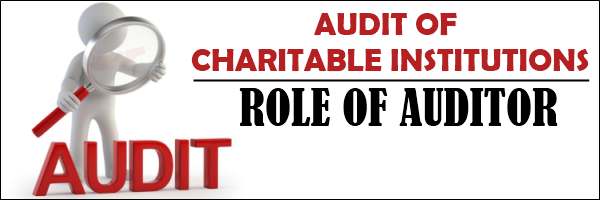Audit of Charitable Institutions | Role of Auditor

Table of Contents
Audit of Charitable Institutions
An auditor may evaluate the internal control system in general, to ensure that the procedure is reliable. He may study the nature of the constitution of the charitable institution, which may be a society, private or public trust or a company limited by guarantee. He should ensure that the institution complies with all the requirements of law under which it is set up. He should also verify the effectiveness of the internal checks relating to receipts and payments and ensure that the amounts received are duly deposited into the bank.
Various forms of ‘Receipts’ of Charitable Institutions
The following are the various receipts that a charitable institution may receive:
1. Subscriptions and Donations
2. Income from Investments
3. Grants
4. Legacies
5. Rent
6. Special events, etc.
Role of an Auditor on Verification of Reports of Charitable Institutions
1. In relation to subscriptions and donations, the auditor may evaluate the internal check relating to the accounting of amount collected.
2. He shall examine all the receipt books used during the period under audit and apply special care while verifying the cancelled receipts.
3. He may test check the counterfoils with cash book.
4. He should also confirm that the total amount collected in the form of subscriptions and donations, as shown by the statements, agrees with the books.
5. He should ensure that the unused receipt books are under the custody of a responsible person.
6. In the case of Legacies and grants, the auditor should examine the correspondence, minutes books and other available information.
7. While verifying the income from investment, the auditor may vouch all the receipts, and examine the schedule of investments to confirm that all income &om the investments are duly accounted. While verifying interest, the rates and calculation of interest are to be checked.
8. The rent received account is to be vouched with the counterfoils of rent receipts and counter checked with the entries in the cash book. The auditor should also examine the tenancy agreement to find out the amount of rent to be collected and the due dates, on which the rents become due.
9. The institution may organize special events, and generate income for charitable purposes. The auditor should thoroughly vouch the receipts and payments relating to such events.
Auditor should verify payments
The auditor should ensure that all payments made by the institution are only for the purpose for which the institution is constituted and no person, who is administering the Trust. (i.e., the trustee, the managing trustee or a member of the managing committee) is personally benefited therefrom. He should also verify the existence of the movable and immovable assets and confirm the cash and bank balances.
The above are the important aspects where the auditor should pay special attention.

